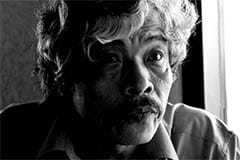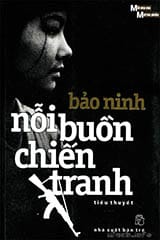
“Better to die than surrender, my brothers! Better to die!” – the battalion commander yelled insanely; waving his pistol, and in front of Kien, he blew his own brains out through his ear. (The Sorrow of War)
An un-put-down-able novel. It should win the Pulitzer prize, but it won’t. It’s too gripping for that. (The Guardian)
Dramatic… Will force American readers to acknowledge how little they still understand of the long war that left such a legacy of grief and guilt in their own country. (The Washington Post)
The Sorrow of War has won worldwide acclaim and become an international best-seller. (Amazon.com)
A good news: 8th, May, 2008, The Sorrow of War novel will be turned into movie by an American director: Nicolas Simon. After 10 years of discussion and negotiation, Bảo Ninh, the novel’s author finally permitted making of the film based on his famous book. The producer, Dominic Scriven, a very passionate admirer and friend of the author, who now holds the book copyright and want to transfer it onto the silver screen. An even better news: 9th, Aug, 2008, author of The Sorrow of War novel stated that he wouldn’t have any further connection with the The Sorrow of War movie project.
The reason given is: film’s script is not aligned with the author’s ideas. In fact, many people is doubtful that an unnamed director would be capable of working on such a great novel, although the producer (Dominic Scriven) ‘s goodwill is widely recognized! The movie project is now paused, in searching for another director! That’s a very good thing in my opinion, in the fear that we would have another history distortion (or even worse)! A picture is worth a thousand words? That’s not always true, think twice (or read the book)! In this case, words are worth thousands of pictures (or a movie)!
The novel is, more or less, an semi – autobiography. Bảo Ninh himself (or the protagonist Kiên in the novel) was a soldier in the 24th battalion, a special formation commissioned to the B3 front (central highland) in 1969. Of the unit’s 500 man, he is among the only 10 survivors. The story is an nonlinear scatter of memories, mixed the past with the moments of post-war time: childhood, a high school’s love story, the battles, and importantly lives after war.
The Sorrow of War is without doubt timeless. Perhaps it is one of the world’s greatest war novels ever written. Imagine the film Apocalypse Now and increase its effect, say by a factor of a thousand – this is the power of Bảo Ninh’s writing. I remember shivers in my spine when first reading the book, some 15 years ago! Just surf around some online bookstores, to see what readers have said about the book:
-
If this book doesn’t make you cry, you have no soul.
-
It’s definitely not a book for everyone, and I nearly put it down during the first 50-60 pages. But, I soon became wrapped up in the story and the language.
-
Books usually lay with me on my bed and after their formal end we sleep together for a few days but after the last sentence I promptly put this right back on my shelf and am having trouble thinking about it again. I had horrible nightmares during the read.
-
This book is amazing. The story progresses thematically rather than chronologically, and leaves you piecing together historical non-fictional events… He succeeds in taking the reader on a difficult journey of emotional and spiritual crisis, right to the core of the human condition and captures a sorrowful despair like no other literature I’ve ever read.
-
Like pouring acid on your moral center…
-
Just an excellent novel. To everybody who considers The Things They Carried the penultimate work of fiction about the Vietnam War: pick up The Sorrow of War and be prepared to be blown away by the stories of a Vietnamese.
-
In fact, my view of just about everything I thought I knew about North Vietnam from the mid-60’s to the mid-70’s was altered by this book.
-
This book is unbelievably emotional. The style of writing is unique: it is not linear or chronological in any way. It is chaotic, a reflection on the subject of the book. The writing style, though chaotic, seems to be a perfected style. The book was written with total disregard to order; there is no doubt that all was deliberate.


